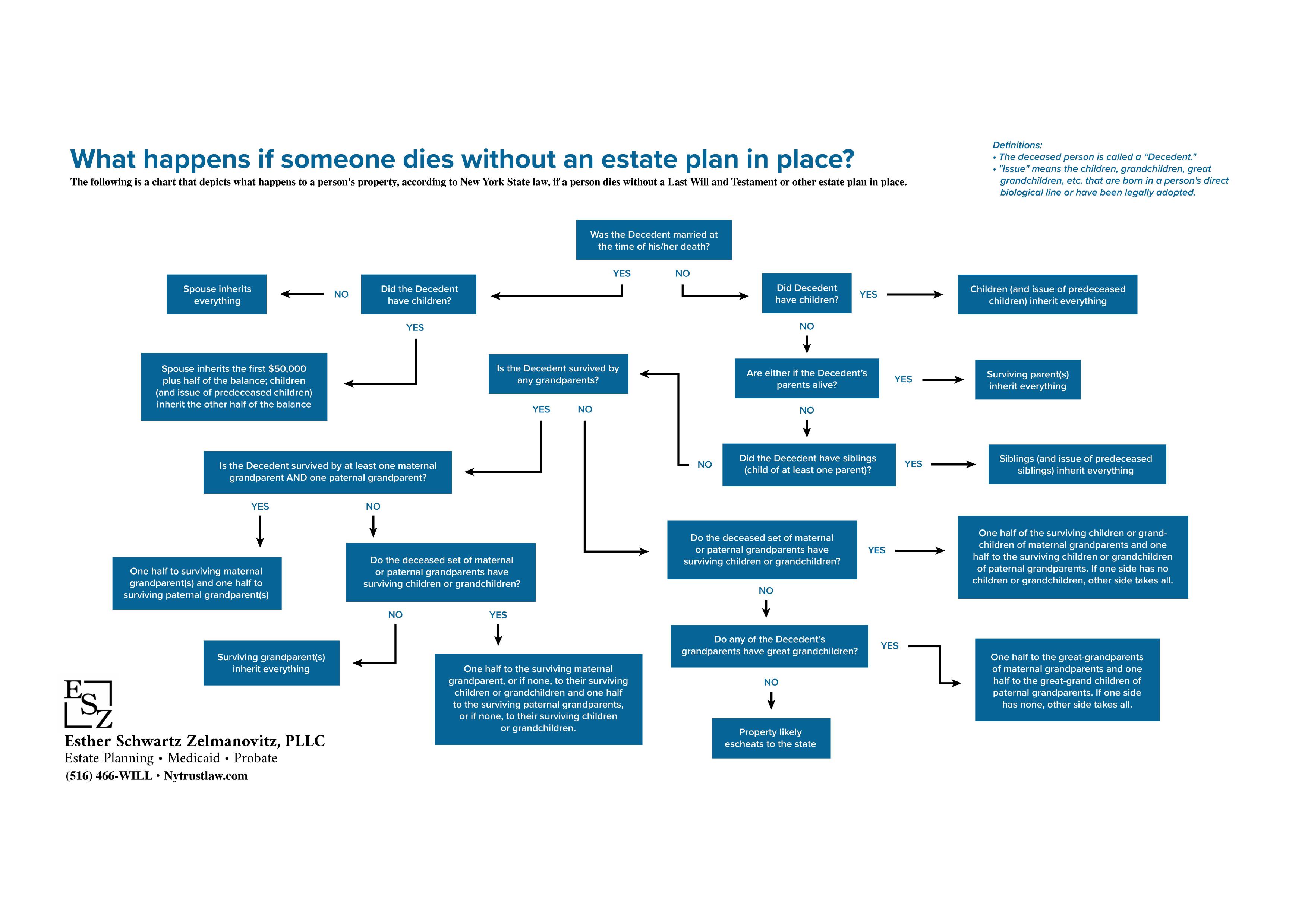
Long Island Last Will and Testament Lawyers
Your Last Will and Testament is an expression of your intention concerning the disposition of your property following your death. Besides providing for an orderly distribution of your assets after your death, a will also allows you to select the person who will handle your estate and even allows you to name a guardian for your minor children. In the state of New York, there are statutory formalities that govern the execution of a Last Will and Testament. While you can prepare a do-it-yourself will from an internet form, this is rarely a good idea.
Even the smallest mistake can render your Last Will and Testament void, leaving your loved ones to deal with the fallout at a time they should be allowed to mourn. An experienced New York elder law attorney can draft a Last Will and Testament on your behalf, which will carefully follow your plan for the distribution of your estate. Esther Schwartz Zelmanovitz, PLLC will ensure your will has no unintended legal consequences and that it is executed in accordance with the strict formal requirements of New York law.
Get trusted guidance from a last will and testament attorney in Long Island. Contact us online or call (516) 347-7356 now to schedule your free phone consultation.
Why You Should Have a Will—and What Can Happen if You Don’t
The number of American adults without a will has not changed much since the early 2000s. Fifty-eight percent of the adult population do not have a will; among GenXers, that number is 64 percent, among Millennials, 78 percent, and barely more than a third of all parents with minor children have a will. Women are particularly at risk, according to the report, with 80 percent of all women dying single, meaning women need to master the art of managing their assets. While it is true that most people simply do not feel the need for a will until they are elderly, the top reason stated for not having a will was simply, “I haven’t gotten around to it.” About a third of all those polled felt they just didn’t have sufficient assets to leave to anyone.
Top Question: Do I need a will?
Having a will allows you to do a number of very important things, including:
- Name an executor whom you trust to manage your assets after your death;
- Leave your assets to loved ones or to organizations of your choice;
- Ensure your loved ones do not have to deal with chaos after your death;
- Name a guardian to care for your minor children, and
- Name a trusted person to manage any assets you leave to your minor children.
If you do not have a will when you die, you have died intestate, and, under New York law, who receives your assets will depend on whether you have a spouse, children, and other living relatives. If you have a spouse and no children, your spouse will inherit all your assets. Likewise, if you have children but no spouse, your children will inherit all your assets, divided equally among them. If you have a spouse and children, your spouse will inherit the first $50,000 of your assets, as well as half of the remaining assets. Your children will inherit the remainder of the assets. The court will decide who will manage your minor children’s inheritance. This may very well not be what you would wish for.
If you have parents, but no spouse and no children, your parents will inherit all your assets. If your parents are receiving long-term care benefits, their benefits may be at risk, or their inheritance may simply be a payment to the nursing home in which they reside. If the decedent has no family at all and leaves no will, the state of New York will receive the decedent’s assets. There are very specific statutory requirements under New York law to have a valid will; it is advisable to prepare a will with the careful guidance of an attorney who is experienced in New York estate planning.
What Does a Will Not Do?
Many people are surprised to learn what a will cannot address. A will is a powerful tool for directing the distribution of your assets after death, but it has its limitations. For example, a will does not control assets held in joint ownership or those designated to a beneficiary, like life insurance policies or retirement accounts. These assets pass directly to the named party, outside the terms of the will.
While a will can set conditions for inheritance that extend beyond simple directives, you will remain tethered to the court for the duration of the term of the directive. For more complex goals, like ongoing financial support, trusts may be a better solution. A will also cannot name guardianship for disabled adults, which requires separate legal processes.
Consulting with a professional, such as a last will and testament lawyer in Long Island, ensures your full estate plan accounts for all details, complies with local laws, and is most efficient for your beneficiaries. Connect with Esther Schwartz Zelmanovitz, PLLC right away for experienced advice.
Rely on the expertise of a skilled Long Island will lawyer at Esther Schwartz Zelmanovitz, PLLC. Contact us or call (516) 347-7356 now to arrange your consultation without delay.


Can I Change My New York Last Will and Testament?
As long as you have the capacity to do so, you can revoke or update your will at any time during your lifetime. As a matter of fact, what you may wish to include in your will today, can be different than your wishes in several years from now. However, because a person never knows when they may die or become incapacitated, it is responsible and wise to have valid will in place.
What Should be Included in a Last Will and Testament?
A person’s last will and testament provides instructions as to what should happen to his worldly possessions after he dies, who should be in charge of administering his final wishes, and in the case of minor children, who should take care of the orphaned children until they reach majority age.


Our Values, Your Peace of Mind The Principles That Define Our Firm
-
Compassionate, Relationship-Driven Service
We believe every client deserves to be treated with dignity, patience, and genuine care. Our firm fosters long-term relationships, guiding families with warmth and empathy through emotionally sensitive matters like elder care, estate planning, and loss.
-
Clear, Respectful Communication
We prioritize honest, prompt, and respectful communication. Whether answering questions or guiding you through complex decisions, we're responsive, dependable, and committed to making the process as smooth and stress-free as possible.
-
Serving with Integrity and Excellence
We hold ourselves to the highest standards of ethical practice and professional excellence. Clients can count on us not just for our legal knowledge, skill and experience, but for honesty, transparency, and unwavering advocacy on their behalf.
-
Tailored Legal Guidance for Every Client
No two clients are the same. We take the time to truly understand each client’s concerns, goals, and values, crafting customized legal solutions that reflect what matters most to them.
Can I Prepare My Own Last Will and Testament?
Technically, the law does not require you to use the assistance of a lawyer to prepare your Last Will and Testament. However, your will must follow very strict statutory guidelines in order for it to be legally binding and for the court to accept it. If a court does not accept your will when it is presented after you die, it will be too late to correct it. Without the court accepting your will, it will have no effect and will not be legally binding.
New York State, in particular, has very strict formalities governing the execution of wills. If a formality is not strictly followed, it is possible that the deceased person’s wishes may not be honored and the laws of intestacy (laws that govern when there is no will) will be applied to that person’s estate.
Further, by preparing a will by yourself, you may miss important provisions that could be beneficial to your estate plan or you may include provisions that would really be detrimental to your plan. An experienced estate planning attorney would review your full situation, and identify what should be included and not included in your will, and also, advise you on which assets would actually be governed by your will, which is often confused.
Example: Dad owned a house and 3 bank accounts. He prepared a will leaving his entire estate to his daughter. His house and bank accounts were jointly held with his son. His poor daughter was out of luck when dad died, because irrespective of what the will said, the son became 100% owner of all of dad’s assets.
Having your will prepared by an experienced estate planning attorney will not only ensure that the will was prepared with the formalities required by the law, but will also give you peace of mind that your estate plan is set up reflecting your overall wishes.
